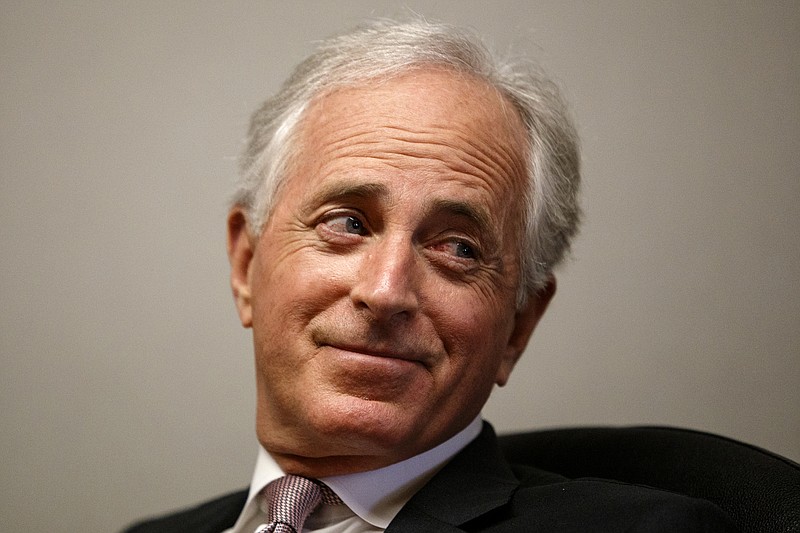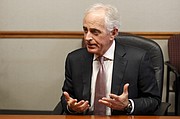President Donald Trump's sometimes combative, critical or nationalistic tweets and comments may be effective in energizing his political base and getting him elected president, but the chairman of the Senate Foreign Relations Committee said Trump's rhetoric threatens to weaken the United States' good will and standing around the globe.
U.S. Sen. Bob Corker, the Tennessee Republican who is leaving the Senate in January, said in a post-election interview this week that Trump's governing model "is based upon division, anger and resentment, and in some cases, even hate."
"He is able to keep his base together by his approach and instead of appealing to our better angels and trying to unite us like most people would try to do, the president tries to divide us," Corker told reporters and editors at the Chattanooga Times Free Press. "There's just no reason for it, and it doesn't take us to a better place to squander the well-earned good will that we have around the world at a time when our leadership is more important than ever."
Corker said America still enjoys strong support and standing around the world, and U.S. policy is usually better than Trump's rhetoric.
"If you think about what we are actually doing and you had rhetoric to go with it to show global leadership, we would be in such a better place than we are now," he said. "With our allies in Europe, obviously the rhetoric is damaging. But if you look at what we are actually doing with NATO on the ground, especially in Eastern Europe where it matters most, we are doing more than we ever have done."
Trump has scolded many European nations for not doing as much as the United States or paying their fair share to support the North American Treaty Organization (NATO), which has both made Trump less popular in Europe but helped to bolster financial support for NATO.
Corker said words matter and Trump's language "creates concern," even when U.S. policy is on the right track.
"People start hedging their bets and they start creating relations with others because they are not sure of where we are going to be," he said. "Now with this nationalist rhetoric and some of the tariffs, there are other entities like China that are trying to step in and act as if they are the new leaders of the global order."
Corker acknowledged that Trump's style probably helped him get elected and gain the favor of many voters and minimize some of his critics. But Corker, who says he hasn't ruled out the possibility of running for president in the future, wonders whether voters will eventually grow weary of the often harsh tone from the president.
"It has been an effective formula and he did get elected and, from a Republican standpoint, he has been effective in getting a lot of things done," Corker said. "But I'm not sure people will appreciate that approach for an eight-year term. Maybe over a four-year period, people will say, 'He shook things up' and I like that." But this could just be a four-year aberration."
Corker, who Trump initially considered as a possible running mate and later as a potential secretary of state, says he has observed and talked with President Trump frequently over more than two years. Trump's tweets and comments "are not an act," Corker said.
"That's just who he is and not the way that I would choose to act," he said. "He is just very combative."
Corker has differed with Trump in the past and criticized the president for his critical style, especially after Trump blamed both sides of the protests for intolerance and violence at the deadly white supremacist rally last year in Charlottesville, Virginia. Corker said the president "was very angry" with him about his criticisms, but he said Trump still said he would support Corker if he ran for re-election.
Corker was heavily criticized by many of Trump's supporters for not fully supporting the GOP's standard bearer. Corker then decided in the summer of 2017 not to seek a third term in the Senate.
"The Republican candidates who ran with Trump won, and those who ran away from the president lost," said Steve Gill, a conservative radio talk show host in Nashville and political editor of the Tennessee Star who is glad Corker didn't seek another term. "Bob Corker had little base before and he has even less now that he has criticized the president so harshly. The idea that Bob Corker has in his mind that somehow being anti-Trump is going to get him a support base either in Tennessee or the rest of the country is beyond belief."
Gill says "there is no way" Corker would have won re-election after his criticisms of the president, citing a June poll by the Tennessee Star conducted by Triton Polling in June that showed more than 62 percent of the 1,040 likely Republican primary voters surveyed had an unfavorable view of Corker.
"I think the only question at this point among Republicans in Tennessee is whether Bob Corker is even less popular than Butch Jones," Gill said, referring to the former Tennessee football coach fired last year after UT failed to win any SEC games in 2017.
Gill said if Corker wants to align with "never Trumpers" opposed to the president, "then he ought to run over on the Democratic side of the aisle."
The outgoing senator bristles at the suggestion that after his criticism of Trump he could not be re-elected.
Corker said he was told by both U.S. Rep. Marsha Blackburn, the Brentwood Republican ultimately elected to succeed him in the Senate, and former Gov. Phil Bredesen, the moderate Democrat who is friends with Corker, they would not run if he sought re-election.
Corker, a former Chattanooga mayor, won his Senate seat over former U.S. Rep. Harold Ford, a Memphis Democrat, by less than 3 percent in 2006 and then easily won re-election in 2012 with more than 65 percent of the vote.
"I think this would have probably been the easiest race I ever ran, if I had decided to run again this year," Corker said.
Tom Ingram, a long-time Republican strategist and consultant who was previously chief of staff for U.S. Sen. Lamar Alexander, said he is confident Corker would have been re-elected if he ran "and he stayed on reasonable terms publicly" with President Trump through the campaign "regardless of what he told the president in private."
But Ingram said Corker's public criticism of a president who is overwhelmingly popular among GOP voters in Tennessee has hurt his political standing, at least for now.
"In this moment in time, imagining him competing for the Republican nomination for senator, president or anything else is difficult because he is so crosswise with Trump," Ingram said. "If we didn't see anything else in this election, this is still Trump's state."
Corker acknowledged that with Trump in the White House, "the whole makeup and ideology of the Republican Party has gone through dramatic change over the past few years."
Republicans were traditionally focused on fiscal conservatism and free trade, but Trump has pushed measures that have boosted federal spending and the budget deficit and imposed tariff duties on steel, aluminum and a variety of other imports. Trump imposed the duties of up to 25 percent on steel and aluminum under "national security" justifications in the 1974 trade act.
"There is no one at the White House that can even explain how we could have a claim of national security to put steel and aluminum tariffs on Canada, Mexico and Europe when you are trying to get at China for what they are doing with intellectual property," Corker said. "It's just nonsensical."
Corker's brand of conservatism could regain favor over time, especially if a trade war worsens and hurts the U.S. economy or voters get more worried about the growing deficit and want a self-described "fiscal hawk" like Corker, Ingram said. The GOP and PR consultant said politics is a cycle of shifts that is constantly changing.
"When I got into politics with Howard Baker and Lamar Alexander in the 1960s and through the 1980s, Tennessee was a Democratic state and the only way a Republican could get elected was with Democratic support," he said. "Now it is predominantly a Republican state that is more conservative. But it will probably cycle again."
Corker is still coy about his future, should the political cycle shift more in his favor.
At age 66, Corker shows no signs of slowing down and insists he hasn't yet decided what he will do when his Senate term ends Jan. 3. The Tennessee Republican wouldn't rule out the possibility of running for president or another political office.
"We haven't eliminated that, but it's not something I want to focus on until I get out [of Congress]," Corker said. "We have three more weeks of legislative activity and I want to finish the work that we're doing free of any kind of political considerations."
Corker said he doesn't plan to work in government relations or run a think tank or university.
"Especially now that the election is over, more things are coming over the transom now to consider," he said. "The easy thing for me would be to go back into businesses. But I don't know what I am going to do and I'm going to take some time to figure that out."
Contact Dave Flessner at dflessner@timesfreepress.com or at 423-757-6340.

